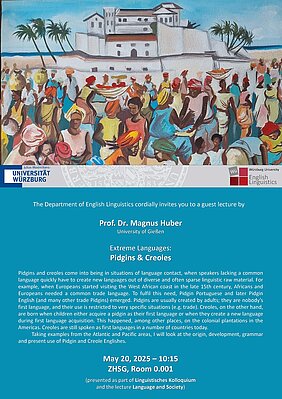Guest Lecture by Prof. Dr. Magnus Huber (May 20, 2025)
13.05.2025Pidgins and creoles come into being in situations of language contact, when speakers lacking a common language quickly have to create new languages out of diverse and often sparse linguistic raw material. For example, when Europeans started visiting the West African coast in the late 15th century, Africans and Europeans needed a common trade language. To fulfil this need, Pidgin Portuguese and later Pidgin English (and many other trade Pidgins) emerged.
Prof. Dr. Magnus Huber*
University of Gießen
Extreme Languages:
Pidgins & Creoles
Pidgins and creoles come into being in situations of language contact, when speakers lacking a common language quickly have to create new languages out of diverse and often sparse linguistic raw material. For example, when Europeans started visiting the West African coast in the late 15th century, Africans and Europeans needed a common trade language. To fulfil this need, Pidgin Portuguese and later Pidgin English (and many other trade Pidgins) emerged. Pidgins are usually created by adults; they are nobody’s first language and their use is restricted to very specific situations (e.g. trade). Creoles, on the other hand, are born when children either acquire a pidgin as their first language or when they create a new language during first language acquisition. This happened, among other places, on the colonial plantations in the Americas. Creoles are still spoken as first languages in a number of countries today.
Taking examples from the Atlantic and Pacific areas, I will look at the origin, development, grammar and present use of Pidgin and Creole Englishes.
*Magnus Huber is professor of English Linguistics and the History of English at Justus-Liebig-University Giessen. He has taught close to 150 courses in a wide variety of subjects in English linguistics. He is an expert on English-based pidgins and creoles and is particularly interested in these languages’ historical evolution and present structure. He is the author of Ghanaian Pidgin English in its West African Context (1999), and edited Spreading the Word: The Issue of Diffusion Among the Atlantic Creoles (1999) as well as Synchronic and Diachronic Perspectives on Contact Languages (2007). He was also one of the editors of the standard reference work The Atlas and Survey of Pidgin & Creole Languages (2013). His other research interests include World Englishes, (historical) sociolinguistics, dialectology, corpus linguistics and historical linguistics, particularly with regard to phonetics/phonology, morphology and syntax.



